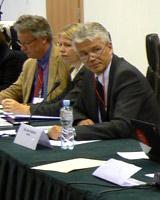
|
|
UNESCO workshop on freedomof expression © UNESCO |
UNESCO held a workshop on “Freedom of Connection – Freedom of Expression: The Changing Legal and Regulatory Ecology Shaping the Internet” at the 5th Internet Governance Forum (IGF) meeting in Vilnius, Lithuania, on 14 September 2010. "Freedom of expression on Internet remains a main concern for the international community," said the participants during a workshop organized by UNESCO on 14 September 2010 and chaired by Mr Jānis Kārkliņš, UNESCO's Assistant Director-General for Communication and Information.
Summary report (available soon) Watch the video Read the transcript Powerpoint presentation by Professor William Dutton and Dr Victoria Nash from the Oxford Internet Institute
The workshop was introduced by the launch of the report, entitled “Freedom of Connection – Freedom of Expression: The Changing Legal and Regulatory Ecology Shaping the Internet”. This research is supported by UNESCO within the framework of the World Summit on the Information Society (WSIS) and as part of its activities related to Internet governance.
The authors, Prof. William Dutton and Dr Victoria Nash from the Oxford Internet Institute, gave a slide presentation to more than 50 participants representing Member States, private sector and civil society. Prof. Dutton pointed out that freedom of expression is not an inevitable outcome of technological innovations. It is not an isolated issue but should be understood within a larger ecology of policy and regulations.
The study shows that with growing access to information in cyberspace there is a raise of censorship and filtering, which is done not only by governmental organizations, but also by private companies, having diverse goals and values. In this regard, Dr Nash analyzed various policy approaches, including industrial policy and regulation, such as copyright, user-centric approach related to child protection policy, fraud, defamation and hate speech, net-centric policy linking to internationalization of domain names and security policy in terms of its relation to privacy and freedom of expression.
The report was commented by Dr Yaman Akdenix from the Istanbul Bilgi University, Turkey, and Mr Alan Davidson, Director of Public Policy for the Americas, Google. A wide range of issues were also raised from the audience, including digital right, filtering and blocking, child protection, the role of intermediates and their liabilities.
Participants agreed that there is a need to continue tracking an expanded range of policies and regulatory issues of the Internet, and explore the relationships between freedom of expression and other key values and rights. More efforts need to be made in order to promote wider citizens' involvement and corporate responsibility in Internet governance. Representatives of the Internet industry and Member States should work together to ensure transparency, promote a multistakeholder approach and protect freedom of expression as a fundamental human right.
The workshop was introduced by the launch of the report, entitled “Freedom of Connection – Freedom of Expression: The Changing Legal and Regulatory Ecology Shaping the Internet”. This research is supported by UNESCO within the framework of the World Summit on the Information Society (WSIS) and as part of its activities related to Internet governance.
The authors, Prof. William Dutton and Dr Victoria Nash from the Oxford Internet Institute, gave a slide presentation to more than 50 participants representing Member States, private sector and civil society. Prof. Dutton pointed out that freedom of expression is not an inevitable outcome of technological innovations. It is not an isolated issue but should be understood within a larger ecology of policy and regulations.
The study shows that with growing access to information in cyberspace there is a raise of censorship and filtering, which is done not only by governmental organizations, but also by private companies, having diverse goals and values. In this regard, Dr Nash analyzed various policy approaches, including industrial policy and regulation, such as copyright, user-centric approach related to child protection policy, fraud, defamation and hate speech, net-centric policy linking to internationalization of domain names and security policy in terms of its relation to privacy and freedom of expression.
The report was commented by Dr Yaman Akdenix from the Istanbul Bilgi University, Turkey, and Mr Alan Davidson, Director of Public Policy for the Americas, Google. A wide range of issues were also raised from the audience, including digital right, filtering and blocking, child protection, the role of intermediates and their liabilities.
Participants agreed that there is a need to continue tracking an expanded range of policies and regulatory issues of the Internet, and explore the relationships between freedom of expression and other key values and rights. More efforts need to be made in order to promote wider citizens' involvement and corporate responsibility in Internet governance. Representatives of the Internet industry and Member States should work together to ensure transparency, promote a multistakeholder approach and protect freedom of expression as a fundamental human right.
